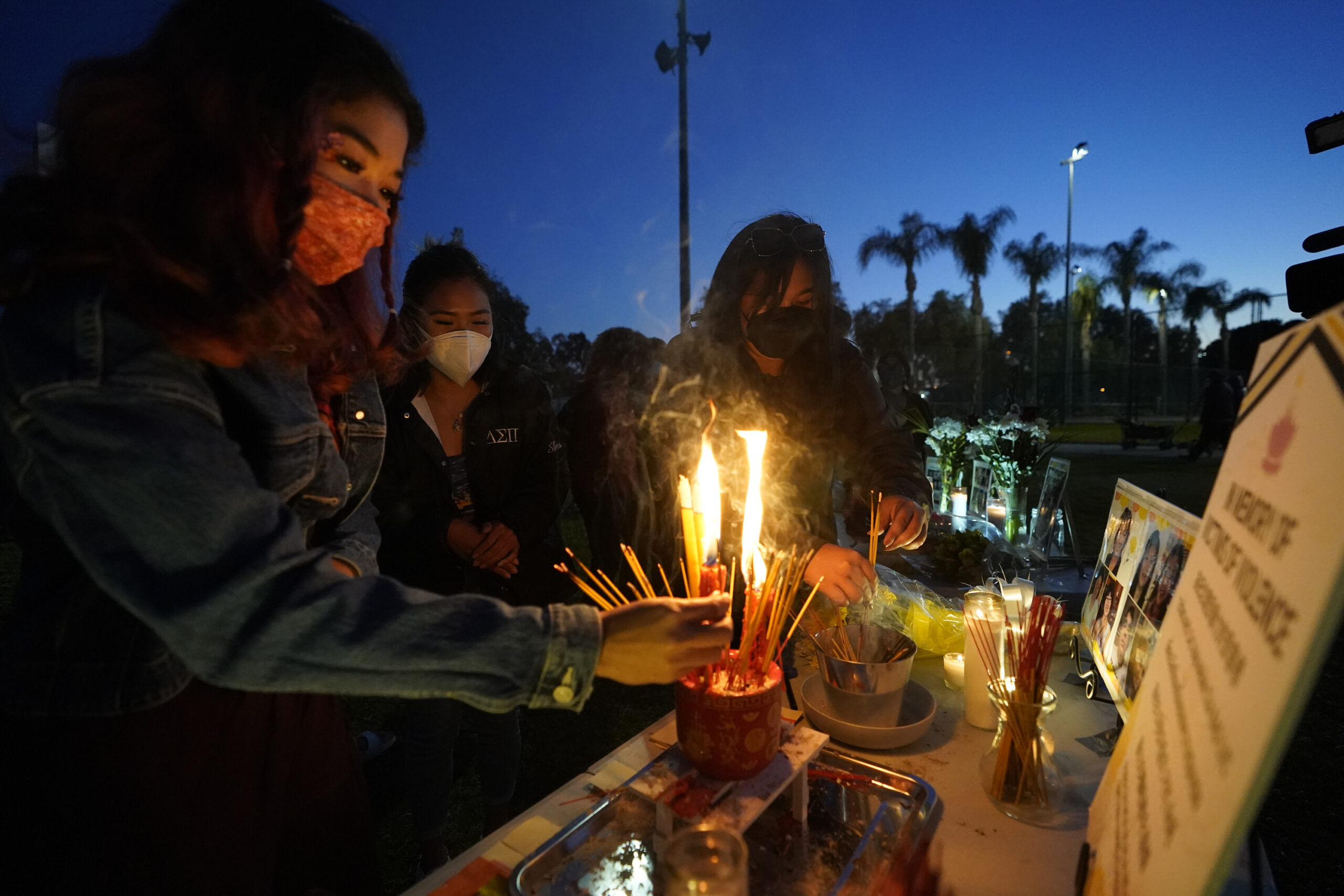After Atlanta Spa Shootings, Biden Commits To Funding To Asian Communities

During a candle vigil earlier this week in Monterrey Park, California, women pay their respects at a memorial in honor of the victims of the spa shootings in Atlanta, where eight people were killed. Six were Asian women. Two weeks after the metro Atlanta shootings, the White House announced an updated plan Tuesday in its response to anti-Asian hate.
Damian Dovarganes / Associated Press
President Joe Biden has committed funding to the Asian American and Pacific Islander community to protect against violence, hate, xenophobia as well as COVID-19 and inequity.
Two weeks after the metro Atlanta shootings, the White House announced an updated plan Tuesday in its response to anti-Asian hate.
“I’m going to watch, and I’m going to wait and see how this is done,” said Sue Ann Hong, president and CEO of the Center for Asian Pacific American Women.
Questions she still has include which community groups will get the funding.
The plan includes setting aside $49.5 million to organizations that support survivors of domestic violence and sexual assault. It also creates a task force to address xenophobia around COVID-19 and a U.S. Department of Justice initiative to respond to anti-Asian violence. It also allocates $33 million for research into bias.
Organizations in Atlanta and across the country have called for $300 million of federal money for community groups to fight anti-Asian hate and inequity.
“They need money,” Stephanie Cho said a day after the Atlanta-area shootings. She’s executive director of the Atlanta Chapter of Asian Americans Advancing Justice. “There’s now tons of victims. There’s also this level of trauma.”
In a letter, nearly 200 community groups, nonprofits and businesses across the country said money is urgently needed for services such as mental health and translation.
Eight people were killed in the spree of shootings at Atlanta-area massage businesses, including six Asian women.
Days later, Biden met with community leaders in Atlanta.
“Hate and violence often hide in plain sight,” Biden said the day of the meeting. “It’s often met with silence. That’s been true throughout our history. But that has to change.”
An investigation is ongoing, and law enforcement officials say “nothing is off the table,” including determining whether the shootings were a hate crime. The shootings happened during a rise of anti-Asian hate during the COVID-19 pandemic.
Many say elected officials’ rhetoric around the COVID-19 pandemic led to a spike in hate against Asian Americans.
According to a report from the organization Stop AAPI Hate, there have been nearly 3,800 incidents of hate against Asian Americans from March 2020 up until the end of February 2021. The incidents are self-reported. A majority were verbal harassment and name-calling and were against women.
Victoria Huynh, senior vice president of the Georgia-based Center for Pan Asian Community Services, said some Asians in the state have been fearful of going out in public.
“We know that the fear isn’t going to go away in a few days or a few weeks,” she said.
Because of the pandemic, some students have been at home during the rise of anti-Asian hate. Huynh says some families are fearful of sending their kids back to school.
“There’s also conversation about, you know, is my child going to be bullied because they have Asian features and look Asian,” she says.
Earlier this year, Biden issued a memo denouncing anti-Asian racism. But groups say the memo didn’t go far enough to address hate and that it didn’t do anything to prevent the shootings.
But they say if action is taken now, it can help Asian Americans feel safe living in the U.S. in the future.
Though Hong is cautiously optimistic about the Biden plan, she praises the responsiveness of the White House.
“I do appreciate the speed at which President Biden and Vice President Kamala Harris addressed and came up with action.”








